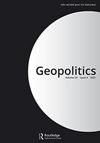The Spatial Dimension of the ‘New’ Chinese State Capitalism: Exploring RMB Transnationalization in Luxembourg and Its Implications for Monetary Autonomy
IF 3.4
1区 社会学
Q1 GEOGRAPHY
引用次数: 0
Abstract
ABSTRACTThe concept of ‘new’ state capitalism has garnered increasing attention among scholars due to the emergence of a polymorphism of state interventions in recent years. These interventions are now being examined through a spatial lens, departing from the previously dominant methodological nationalism. In this case, the ‘new’ Chinese state capitalism is particularly noteworthy. The People’s Republic of China (PRC) has adopted a spatial state-led strategy to facilitate the Renminbi (RMB) transnationalization. This strategic approach transcends traditional national boundaries, stretching across different spaces. Our research focuses on the specific case of Luxembourg in relation to this spatial strategy. We assert that the RMB transnationalization represents a distinctive feature of the ‘new’ Chinese state capitalism, as it is underpinned by explicit Chinese state policies, unlike other currencies whose global use was the result of growing economies. Moreover, we contend that the PRC’s explicit policies regarding the RMB do not aim for full convertibility and widespread acceptance like the US-Dollar (USD). Instead, they prioritise its role as a trade currency for international trade settlements, as the main goal is to reduce the dependence on the USD and to create a stable International Monetary System (IMS) that will bring benefits to its trade-oriented economic model. Overall, this paper significantly contributes to the existing literature by offering a novel perspective on the RMB transnationalization within the framework of the ‘new’ Chinese state capitalism, emphasising China’s quest for autonomy from the USD. Disclosure StatementNo potential conflict of interest was reported by the author(s).“新”中国国家资本主义的空间维度:卢森堡人民币跨国化及其对货币自治的启示
摘要“新”国家资本主义的概念越来越受到学者们的关注,因为近年来出现了多种形式的国家干预。这些干预措施现在正从空间的角度进行审查,脱离了以前占主导地位的方法论民族主义。在这种情况下,中国的“新”国家资本主义尤其值得注意。中华人民共和国(PRC)采取了国家主导的空间战略,以促进人民币(RMB)的国际化。这种战略方法超越了传统的国界,延伸到不同的空间。我们的研究重点是卢森堡与这一空间战略相关的具体案例。我们断言,人民币的跨国化代表了“新”中国国家资本主义的一个显著特征,因为它是由明确的中国国家政策支撑的,不像其他货币,其全球使用是经济增长的结果。此外,我们认为,中国关于人民币的明确政策并非旨在实现像美元那样的完全可兑换和广泛接受。相反,他们优先考虑人民币作为国际贸易结算的贸易货币的作用,因为主要目标是减少对美元的依赖,并创建一个稳定的国际货币体系(IMS),这将为其以贸易为导向的经济模式带来好处。总体而言,本文通过在“新”中国国家资本主义框架内提供人民币跨国化的新视角,强调中国对美元自治的追求,对现有文献做出了重大贡献。披露声明作者未报告潜在的利益冲突。
本文章由计算机程序翻译,如有差异,请以英文原文为准。
求助全文
约1分钟内获得全文
求助全文
来源期刊

Geopolitics
Multiple-
CiteScore
7.60
自引率
10.30%
发文量
50
期刊介绍:
The study of geopolitics has undergone a major renaissance during the past decade. Addressing a gap in the published periodical literature, this journal seeks to explore the theoretical implications of contemporary geopolitics and geopolitical change with particular reference to territorial problems and issues of state sovereignty . Multidisciplinary in its scope, Geopolitics includes all aspects of the social sciences with particular emphasis on political geography, international relations, the territorial aspects of political science and international law. The journal seeks to maintain a healthy balance between systemic and regional analysis.
 求助内容:
求助内容: 应助结果提醒方式:
应助结果提醒方式:


